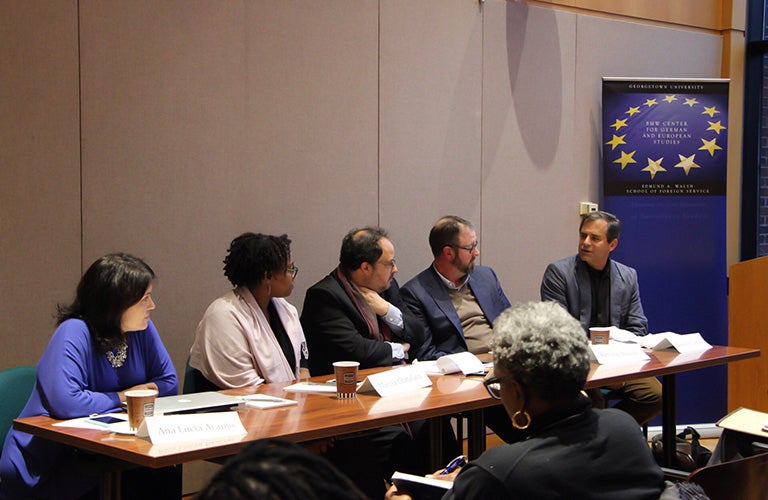BMW Center Hosts "Decolonizing the Museum" Panel
November 29, 2018— Earlier this month, the Georgetown BMW Center for German and European Studies hosted a roundtable on “Decolonizing the Museum,” featuring historians from Howard University, the University of Virginia and George Mason University.
The conference was founded in light of ongoing discussions of race, identity and colonization in cultural institutions inspired by the opening of the National Museum of African American History and Culture. As more German institutions have implemented exhibits that discuss their colonial history and their nation’s actions in diverse societies, the conference was organized to facilitate a discussion on how museums should proceed when addressing such history.
“My co-organizer, Ana Lucia Araujo of Howard University, and I hoped to create connections between efforts to decolonize distinct educational institutions — both museums and universities,” said Katrin Sieg, a professor of German at Georgetown and one of the organizers of the event. “Both were deeply implicated in the project of training white citizens to take up leadership roles in deeply unequal societies.”
Araujo moderated the roundtable, which brought together four historians, each of whom had played a different role in addressing their institution’s history with slavery.
“Each panelist had taken on a leadership role at their respective institutions in researching their university’s past involvement in the slave economy and carrying discussions about the obligations resulting from this involvement forward,” said Sieg. “This took different forms, from archeological excavations of sites where slaves gathered for spiritual practices, to curricular innovation, to creative projects.”
Marcia Chatelain, an associate professor of history and African American studies, discussed her role working on Georgetown’s Working Group on Slavery, Memory and Reconciliation. While she noted that the University still has work to do, she commended the commitment it has exhibited in extending the conversation of its history with slavery into many different spaces.
“It does make a difference that our president talks about it at first-year convocation — I know a lot of parents were shocked by that,” said Chatelain to the audience at the roundtable. “When we come together as a community, we put racial injustice at the center of this nation. I believe those practices are where it makes a difference.”
Derek Goldman, a professor of theater and performance studies in the Department of Performing Arts, and co-founding director of the Laboratory for Global Performance and Politics, noted that Georgetown’s community has expanded how these discussions can be conducted to include creative and artistic responses.
“I think performance can facilitate memory and offer an opportunity to be a witness,” Goldman said. “Performance can be a research methodology.”
Since Georgetown’s Working Group publication, Goldman has been working on bringing an original play portraying a higher education institution who is grappling with its history of slavery.
Kirt Von Daacke, a dean and historian from the University of Virginia, called for a national consortium of schools to address this problem. His institution realized the necessity for such an organization after it was inspired by its students to address the university’s deep ties to slavery. The consortium would help schools like George Mason, where history professor Benedict Carton has been grappling with how to address their namesake participation in slavery.
Chatelain believes that while addressing racial injustice need not be a university’s main focus, the university can play a role in both important community research and the development of socially conscious citizens.
“Universities are unable to facilitate racial healing,” Chatelain said. “Universities need to focus on their original missions — to teach young people to be socially conscious and active in this discussion by encouraging participation in social and racial justice projects in places like Louisiana, where many of the slaves sold by Georgetown Jesuits ended up. Only through their students can universities begin to make up for their history.”
For Sieg, the roundtable served as a reminder that universities can make amends for their involvement in slavery in ways beyond memorials or scholarships for individual descendants. She hopes the audience left the roundtable with a new understanding of the challenges of racial history.
“I hope scholars and students from different universities learned from each other about strategies that help sustain the current commitment to racial justice among students, faculty, and the university administration,” said Sieg. “It was heartening to see that racial justice work is a lifelong commitment for participants in the roundtable, and for many of the colleagues and students in the room.”
